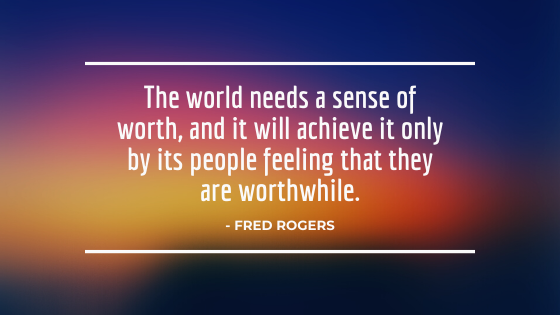Just the Way You Are
I remember watching Mr. Rogers Neighborhood from a comfy brown chair in my grandparents’ den almost every day. Cheerios in hand, or maybe a slice of raisin bread, I was a regular. My favorite segment then was the Neighborhood of Make Believe, but now I cherish Rogers’s real-life message of radical acceptance.
“There's no person in the whole world like you,” he told us, “and I like you just the way you are.”
Fast forward nearly forty years, and my work finds its center of gravity here, in the belief that everyone possesses a distinct “is-ness.” Without exception, the most important thing I know about any client or patient is what I know about every person - that their essence is good and unique. A person’s dignity is utterly whole, I believe, whether they are healthy or not, high achieving or not, making good decisions or not, and so forth. Each of us deserves to be seen and heard and loved — just as we are, not because we are enhanced, extraordinary, or otherwise #winning.
Notwithstanding the problems we have and the mistakes we make, I don’t ultimately want to fix anyone. When I am coaching a client on some growing edge, I aim to move them towards their “is-ness,” not change it. With my politics, I want to dismantle unjust systems, not human beings. And, at the hospital, I am blessed with the opportunity to practice radical acceptance as my core duty. To ground all of these, and because I deserve it, I also try to love myself. (I do all of this imperfectly, of course.)
Like many people who love Mr. Rogers, and probably like Mr. Rogers himself, I know how difficult radical acceptance can be.
American culture generally sends us messages that oppose Mr. Rogers’s simple, but demanding, call to compassion. By the time we are in mid-life, we are steeped in the illusion that our worth is extrinsic. Even when we know better, we hang our self-worth on others’ affirmations, or arbitrary, external standards. The pressure to succeed by the measures of other people — be they family, friend, professor, mentor, bully, cultural icon, political hero, or some other giant — is tremendous. Their power over us is nonsense, of course, but it is stubborn and dangerous nonsense that can warp our senses of self.
Social media intensifies this. Instagram is a torrent of aspirational images. On LinkedIn, we see our colleagues kick ass, and we rarely see them struggle. Twitter and Facebook are regularly weaponized for shame of all kinds. And let us never forget that these are essentially marketing tools — used to sell us many things, including the false idea that our inherent self-worth is inadequate. In this context, it is easy to get stuck in loops of comparing and competing, which make us feel less-than.
To guard against this negativity, we suit up in privilege and emotional armor. And those warp our ways of being in the world — from wholehearted, present, and trusting to anxious, hoarding, and entitled.
F-bomber Mark Manson warns, “When you give too many fucks—when you give a fuck about everyone and everything—you will feel that you’re perpetually entitled to be comfortable and happy at all times, that everything is supposed to be just exactly the fucking way you want it to be. This is a sickness. And it will eat you alive. You will see every adversity as an injustice, every challenge as a failure, every inconvenience as a personal slight, every disagreement as a betrayal.” This situation is toxic, and we need to push back.
However, it isn’t easy. First, most of us can’t simply opt out of the dominant culture, nor do we necessarily want to. Responsibilities tether us to the mainstream, and many of our loved ones hang out there, which is nice. So, we must learn to be in the culture, but not of it. Second, challenging any status quo requires courage and intentionality - and that presents a paradox. Somehow, we must cultivate fertile ground for change without it becoming yet another way to compare and compete. Our resistance defeats itself on its own terms when it divides us.
In light of these challenges, my hope today is small, but mighty…that just a few more of us will embrace radical acceptance.
My bigger dream — one with a longer tail than my lifetime — is that, like Mr. Rogers and other saints before us, we will seed a small movement, then a ripple, and a flood towards kindness. Let us take our inspiration from the poet W.H. Auden, who brilliantly captured the human condition when he wrote, “You shall love your crooked neighbor with your crooked heart.”
In that spirit, a blessing: May we learn to rest easy in who we are, how we are, and where we are — just the way we are. May we know kindred spirits who see us, accept us, and love us. And may we extend such grace to others, in ever-widening circles of care.
🖤
Jenny
